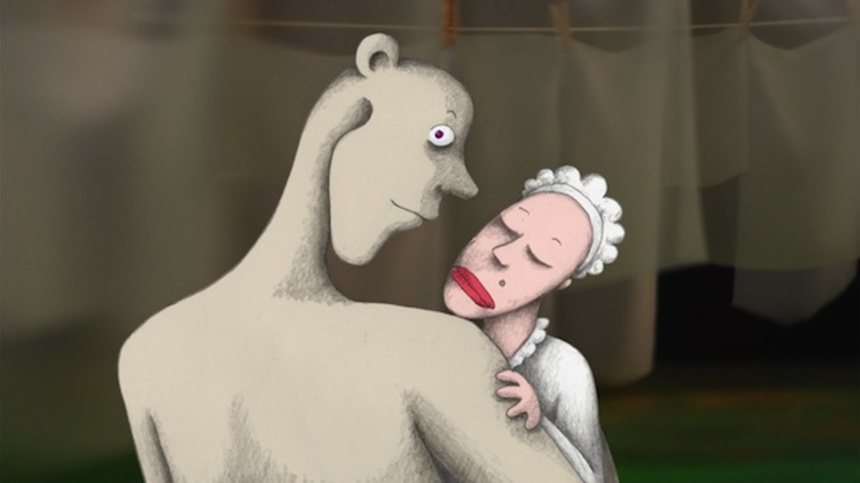Destroy All Monsters: Narratives Of Normal At Rendezvous With Madness 2014

The Rendezvous With Madness Film Festival is taking place in Toronto this week (November 10-15). Its purpose only seems to be becoming more vital. I don't think we've arrived at the watershed moment on the public conversation around mental illness, addiction, and treatment issues yet, but it feels like it's getting closer. Much of 2014 has edged us closer still.
The festival, by mission, aims to investigate the mythologies surrounding mental illness. That mythology - and its evil twin, the narrative of "normal" - forms the spine of much of the fest's ongoing dialogue. Of course, film festivals with "missions" can be tricky: the work can be at odds with the declared purposefulness of the work, if care is not taken in the breadth and balance of the selections.
Rendezvous, thankfully, feels like it's advancing the conversation in thoughtful ways, and tracking the interplay between the perception of an issue and the manner in which those affected perceive themselves.
I watched a handful of the festival's films earlier this week, each from women directors and each featuring female leads (which, unfortunately, still qualifies as a standout track record even in film festival programming, let alone mainstream films). Signe Baumane's opening night film Rocks In My Pockets is a single-voice animated narrative about mental illness and family history; Delphine Noëls' Post Partum is an unsettling family drama about post partum depression; and Anja Marquardt's She's Lost Control looks at the life of a sex surrogate as she navigates her relationships with a trio of clients.
There's a throughline in each about narrative and counter-narrative, stories straightened and rewired to better fit within established social norms, whether they be about wellness, motherhood, or treatment.
Rocks In My Pockets accesses this idea the most directly. It's a film of literal narration throughout, as Baumane - writing, directing, and performing (in multiple exaggerated "voices" when speaking for other people in her own story) - makes an extensive verbal account of her relationship with her own mental illness.
This absorbing and oftentimes absurdly delightful self-told tale rapidly becomes a kind of oral-history archaeological expedition through the half-truths and retcons that her very large Latvian family has created in order to normalize and conceal the recurring string of suicides that has moved through the generations. The onscreen animation which accompanies the spoken word can be crude, but is more than made up for by the giddy linguistic daring (and sheer performance bravado) of Baumane's voiceover.
Moreover, the film is a fascinating exercise of mapping the sources of self-destructive thought, even if they predate one's own life. It suggests the continuity of mythology around mental illness on a personal scale, and thereby becomes a keen study of how the same forces are at work on a macro scale, community-wide.
And so, we begin to see the sheer complexity of the idea of illness, as it is both experienced by, and then immediately propagandized against, by the entire cast of Baumane's characters. What is a family, if not a series of recurring patterns and possibilities? What are Baumane's suicidal thoughts, if not the same?
The family connection is taken in a wholly different, disturbing direction in Post Partum, which watches a new mother, Luce, succumb to ever-deepening post partum depression. As such, Post Partum nearly acts as a horror movie about the relationship between expectations of motherhood and the unreliability of Luce's mind.
There is clearly an external narrative at work about what motherhood should be like. When we meet Luce, she is so giddy with excitement about the imminent arrival of her daughter that she nearly grins her face off the screen. When depression immediately forces a wedge between those expectations and Luce's actual experience after the child is born, we watch the character struggle to build a working bridge between the two.
"Trust yourself," a pediatrician tells her after a panicky, midnight flight to the ER; the horrible reality of the film that unfolds is that Luce can't, and ultimately shouldn't.
Simple camera tricks underline and enhance the mood. Reversed footage is used frequently. The effect can be applied subtly (an unmarked closeup of Luce crying, where we might notice after a moment that the tears are moving backwards), or not (a reverse-action live birth, the screaming baby slowly disappearing back inside her mother's body, is one of the most startling shots I'll see all year).
Where Post Partum tilts elliptical, She's Lost Control plays absolutely straight, photographing in quiet, uncomplicated setups its sex-surrogate principal character, Rhona, as she works with three clients.
Here, the narrative and counter-narrative seem to be contained in Rhona herself: she counsels her patients on intimacy issues while we watch the necessary dispassion of her personal life begin to show (in some cases quite literal) cracks and signs of stress. As Rhona's own intimacy issues inevitably invade her tightly-compartmentalized professional space (this is a movie, after all), the negotiation that ensues mirrors the one we're all undertaking: between who we think we ought to be, and who we can't help but be.
Rendezvous With Madness continues through Saturday night at the TIFF Bell Lightbox. Destroy All Monsters is a weekly column on Hollywood and pop culture. Matt Brown is in Toronto and on twitter.







